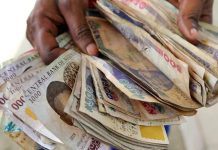Following the lingering Boko Haram Menace, Nigeria is expected to spend a total of close to $9.5 billion on its defense over 2018-2022, and the country’s military expenditure is expected to increase at a CAGR of close to 9 percent to reach over $2 billion by 2022, the report added.
According to the ‘Future of the Nigeria Defense Industry-Market Attractiveness, Competitive Landscape and Forecasts to 2022’ report, the Nigerian defense budget, valued at around $1.5 billion in 2017, registered a negative CAGR of over 10 percent during the historic period
Nigeria has a long history of internal conflicts negatively affecting its economic growth and stability. The recent emergence of radical Islamic group Boko Haram intensified the rebellion in northeast Nigeria and led to a state of emergency announcement by the President regarding the affected states.
The report said the country’s capital expenditure’s share of the total defense budget increased from over 16 in 2013 to about 30 percent in 2017, and is expected to increase to an average of about 26 percent over the forecast period.
Allocations towards the army are expected to marginally decrease from an average of about 36 percent over the historic period to over 35 percent over the forecast period.
Similarly, allocations towards the navy are expected to decrease from just over 20 percent during the historic period to about 20 percent over the forecast period.
Allocations towards the Nigerian Air Force are expected to decrease from over 21 percent during the historic period to about 21 percent over the forecast period.
The report further stated that Nigerian homeland security expenditure increased from almost $1 billion in 2013 to about $1.5 billion in 2017, registering a CAGR of over 11 percent during the historic period.
Threats from Boko Haram and increased drug trafficking are expected to drive the country’s focus on defense spending, the report noted.
In order to counter these threats, the country is expected to invest in surveillance and intelligence technologies such as electronic identification documents, e-passports, automated border crossing systems, bio-metric identification, and CCTV (closed circuit television) systems, which are expected to be covered under defense spending.
As a result, the Nigerian homeland security budget is expected to increase at a CAGR of almost 14 percent over the forecast period, from around $1.7 billion in 2018 to close to $3 Billion by 2022.
Traditionally, the country has been an importer of weapon systems as domestic military production is small-scale and technologically inferior, Business Post reports.











